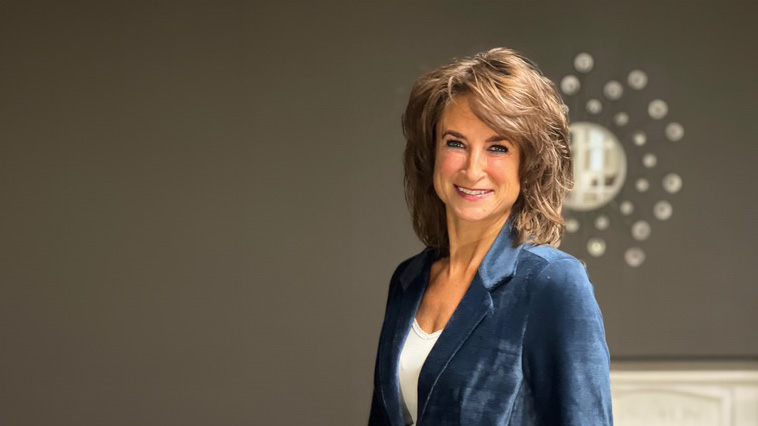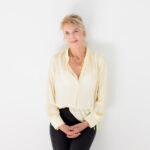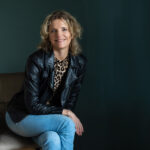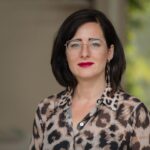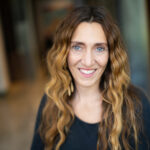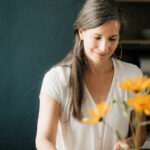“I have never felt less of a woman for not having children.”
Nathalie Sterk
An interview with Nathalie Sterk (Oslo, 49)
Nathalie is used to living alone, but at the time of the interview, she has a friend living with her for a while, which she says, is “very, very beautiful.” She has always lived on her own, which according to statistics is something many people do in Oslo. The highest proportion of persons living alone in Norway is found in Oslo, where 28 per cent live alone.
Is living alone something you always wanted?
It has not been a conscious choice that I want to live on my own. No, it hasn’t been that. But it has unfolded that way. I would like to, as I call it, settle down with somebody. I feel settled in my own apartment, but I am open to having a partner and to live together. Even though I have had several relationships, it never got to the point where we decided to take the next step and move in together. This current experience of sharing a space has been valuable and precious, because I have found it very joyful to live with another, considering I haven’t lived with anyone before.
Often when we talk about ‘settling down with somebody’ this picture kicks in of a family. We are going to settle together, but that is not enough, so it needs something extra, like three kids and a dog. Can you relate to that?
Yes, that picture is there. They call it the ‘white picket fence picture’, which means, according to Google, the ideal middle-class suburban life, with a family and children, large house, and peaceful living. But it doesn’t have to be that way. Like I said, I feel very settled now. I’d rather live on my own instead of being in a relationship or living with somebody where it is not harmonious, and the relationship is not evolving. Having a relationship should be enriching and that is something that I am open to.
You share that you have had several relationships in your adult life. Was there ever a point in one of those relationships where you felt that you could settle down and have a child with this man?
Not really. My dating life has mainly comprised of several short relationships, in relative terms. With a couple of boyfriends there was loosely talk about moving in together, but action was not taken, therefore it never happened. In one of my relationships, we also had a talk about having children. I have not had that conversation with other partners. This was more a conversation I had within myself, from a knowing that I wanted to have children.
Nathalie shares that she has been pregnant once in her life, around the age of twenty.
My boyfriend and I had not been together for a long time when I realised that I was pregnant. When I found out, I knew instantly that I was going to have an abortion. It was totally fine for my boyfriend; it was never an issue, so to speak. He had already had two children. And having the abortion has never affected me. I haven’t looked back one second. If I had kept the child, it would be around 30 years old now. I could have had grandchildren by now! That is a bit strange to think about, but it hasn’t impacted me at all. I did not want to keep the child but knew that I would be a mum in the future.
Can you share more about that knowing and how you related to motherhood and children while growing up?
I grew up with three younger brothers,—one has passed away—and always connected super well with them. I loved them. I loved taking care of them, which I did a lot. I was like a second mom to my brothers, because our mom was emotionally not able to be there for them. Back in my childhood, I experienced her as a cold woman who more or less rejected her children. I wanted to be there for my brothers and give them the love that she could not give. I nurtured them and spent time with them, something she did not do. Also, I connect very well with kids in general, like my friends’ kids. I adore kids. Even today, when I see kids on the street, I smile. Children touch me somewhere deep inside. My internal dialogue was about looking forward to having kids of my own. When I was a teenager, I knew I was going to be a mom. There was no question about it. I would make a great mom and that got confirmed by many people around me. “Oh, you are going to be great mom!” I heard that all the time. There was no question inside of me that I was going to be a mom at some point. I even had names for my future kids.
When you talk about kids and how much you adore them, your whole face lights up. I can feel the adoration. In what way did the internal conversation change during the years, for instance, when you turned thirty or after your forties?
In my relationships, except for one, we never reached that point where we seriously talked about having children. There was a point where a lot of my friends around me settled down with a partner and had kids. I was like, “Oh my god, where’s the father of my children?” I was looking around for quite a few years in my late twenties and early thirties. “When am I going to find someone who I want to have children with?” You could say I was a bit desperate for some years in my late twenties and the beginning of my thirties.
I was feeling unsettled inside myself and felt to hurry up a little bit, you know, ‘the clock is ticking.’ I went back and forth about this, at times freaking out and being in fear that it would never happen.
When I was around 32, I started a relationship with a man who had two kids from a previous relationship. This was the longest relationship I had; we were together for four years.
What was it like for you to be with a partner who already had children?
Being with a partner who had children was normal, and very beautiful. The kids were already almost teenagers, so it wasn’t a big deal. I connected very well with them both, but because we didn’t live together, I was not a mother figure for them, you could say.
Did it ever come to a point that you both wanted to have a child together?
Yes, he was open to having a child with me. We talked about it, and I remember being scared about asking him or talking with him about it, because, “What if he said no?” Later, when I was 36, I consciously made the decision that I was not going to have children in this life. I experienced a realization, that I could make a choice about this. That was huge for me, because all my life I never felt it was a choice. I am going to have children. I am a woman, that is how it goes. I am great with kids, I love kids, there is no question about it.
How did you come to this realization? Did you get a reflection from somebody?
I had a talk with a woman who inspires me deeply; she is a role model to me. She doesn’t have children and shared a little bit about her experience.
She shared there’s no need to have children, even though you’re a woman. To me, that was huge.
The revelation came when I was 36 and when I made the choice that I am not going to have children, it felt like a huge weight was lifted off my shoulders. I cried, as I could feel something big was happening inside of me. I did not feel sadness, more a settlement. After that I have never looked back, not one second. I told my partner, and he was fine with it. The relationship ended later, but not because of my decision.
Your experience shows the importance of having role models in our life; in this case women who reflect that it is more than okay to not have children. What was the response from the people around you?
My parents and many of my friends were very surprised. They couldn’t believe it. If they knew someone who would have children, it would be me. It is a big consciousness that says, ‘if you are a woman, this is what you do – have children.’ And, up to that point, I was totally part of that.
You say that it felt like a weight fell off your shoulders. Can you share a bit more about this? Was that the weight of pictures, expectations, and pressures from outside?
Totally – all of the above. But most of all, the pressure that I had put on myself. That was the biggest burden. “I am going to be a mother and I need to find a father.” But there was more because I also did not want to be a single mother. I have friends who are not together with their partner and are single mothers. I didn’t want that. And then you also have the pressure from society, that as a woman, you should have children. That whole weight fell off my shoulders. And yes, also expectations. I put expectations on myself and felt them from people around me, like family and friends. People would ask me, “When are you having children?” From a young age, I had felt the expectation, even though it wasn’t always expressed out loud.
You shared that in your experience, your mother was cold and not nurturing towards you and your brothers. Did you have this idea that you would parent completely differently, compared to your mother? In many cases this comes from a reaction, because we don’t want to be like our mother.
Oh, for sure. That already started when I was a teenager. I was very different from my mother. There is no way I would be able to reject my brothers or be cold. I felt responsible for them from a young age. And it wasn’t asked of me. I guess I put the expectation on myself that I needed to take care of my brothers. I felt I needed to show them something else. And yes, before I dealt with the issues I had with my mother, there was this fear about how I would be as a mother, because of what I had experienced with her. I was afraid that I would pass that onto my own children. Yet at the same time, I knew that I wouldn’t, because I am not like her. I remember saying to myself, “I will never be mothering like my own mother.” This was definitely part of my inner dialogue.
How is your relationship now with your mother?
It’s all good now. We have talked about it. I have worked through it and now have a good relationship with her. During many years I dealt with my childhood issues, mainly, and especially, the relationship with my mother, and she was open and inviting to listen to me and talk. She recognized that she was emotionally unable to provide the nurture, love, and care to her children, and this made it easier for me to understand her perspective. She even apologized for her lack of emotional presence. Slowly I was able to let go of the resentment of never having been nurtured by her and for not having felt loved by her. I am able now to see where she is coming from, and we’ve had a very beautiful relationship for many, many years now. She is totally different with her grandkids. It is amazing seeing her with my nephews and nieces. What she could not be with us – my brothers and myself – she is with her grandchildren. It’s beautiful to see.
You are an aunt. How do you feel about this role?
I became an aunt nine years ago. I have been very much involved in the life of my nephews and my niece, especially my first nephew. I often picked him up from kindergarten, which was wonderful. I would babysit him now and then, and I have thousands of pictures and videos of him. I have a special relationship with my nephew. I have spent precious time with him over the years. I have followed him closely and have seen him grow up. I see him less now as he has his friends and other activities. I have two more nephews and one niece. Looking back, I had been caught by the ideal that I had to be a great aunt. I was convinced I had to see them regularly and was running around to meet up with them. I didn’t want them to forget me or something silly like that. I have settled more with this, and I am not as eager to run around and visit them all the time.
You were inspired to realise that you don’t need to have children to be a woman. What does it mean to you, to be a woman?
It has literally, as you say, nothing to do with having children. For me being a woman is more about being all of me and for instance, feeling into what I want to wear, what make-up to put on and having a rhythm in my life. This includes more or less everything; from what time I get up and what time I go to bed and everything in between. I have seen many examples of women forgetting about themselves when becoming a mother, which is a bit sad. Many women who are a mother, seem to identify with being a mother first, and second as a woman. I don’t even know how that feels because I don’t have children. I do know though, that we are always a woman first. By that, I mean the expression I bring out into the world in terms of everything about me, including how I live my life and the relationships I have, how I interact with people, and simply everything. And there is always more, which is amazing. And with this conversation, this is coming more into my awareness, which inspires me.
With that sense of settlement about life you can be a role model for others, reflecting that you can have a fulfilled life without having children. I did not have a role model like that while growing up. The women who were not a mother, and there were only a few, did not seem to live with a sense of feeling complete and settled within themselves.
Yes, definitely, and this also relates to what I said about being single. I don’t need a partner to fulfill me. I am more focused on settling deep inside myself and bringing out the woman that I am. I am not busy with adding something to my life. There is more for me to unfold, but yes, I can be a role model. I have never felt less of a woman for not having children.
Do you feel like a parent and if so, what is the ‘job’ of a parent?
Yes, I know that I am a parent, I just hadn’t looked at it in that way until a few years ago. But I am a parent. I feel as parents, we reflect something to children. When I am with my nephews and niece, and the parents are not there, it’s not like they can do whatever they want because they are not my children, so why should I care? They may say they are allowed to do something, but for me it’s a no. I am very clear about the fact that when their parents are not there, I am in charge. It’s not because I am the auntie that I let them do whatever they want. I notice that they like it when I give them boundaries. I can be stricter than their parents. I sense that children need, and want, clear boundaries and a certain set of regulations so they can settle within that, to avoid uncertainty and unclarity.
Is there a last thing you would like to say?
I have spoken to a few women over the years and when I say that I don’t have children, by choice, they are surprised. “Really? You chose to not have children?” I think a lot of women don’t realize that they actually can make that decision on their own. I’ve also heard a few comments from women, that if they had realized earlier that they didn’t need to have children, they wouldn’t have. Although they don’t regret it, they never considered that they had a choice. They thought that this is what you do because you’re a woman.
I’m very happy to be a reflection for others that it is possible to be settled, feel harmonious and not have your own children.
You were not born to have children, you were born to be you – whether you have children or not, it doesn’t matter.
✺
